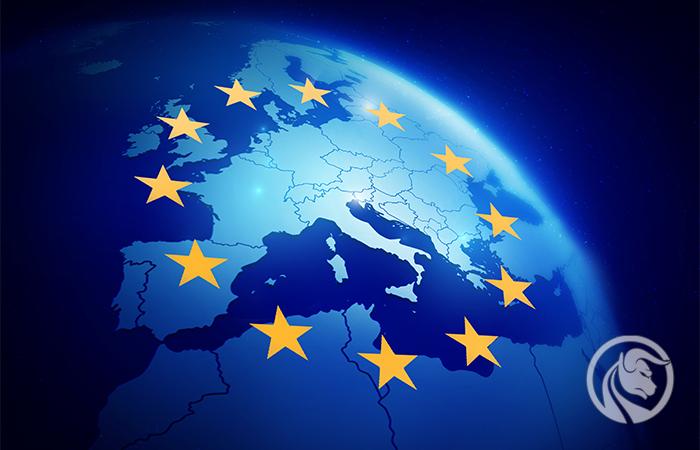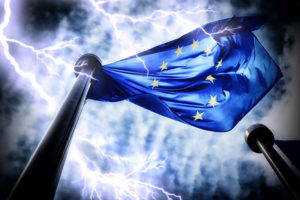The European Union is taking up cryptocurrencies and planning to establish a "super-supervision"
The largest and most important cryptocurrencies are to be watched more closely by officials of the European Union. Later this year, a law is to be created that will precisely define the EU approach to cryptocurrencies. Interestingly, there are to be separate regulations for leading tokens and those that are just being created.
Until now, the European Union has not dealt with too much detail about cryptocurrencies. It did not implement any regulations, did not establish laws, did not even make suggestions on how to approach them.
But this is a thing of the past, because soon we can expect the establishment of a kind of "super-supervision" that will control cryptocurrencies as a whole - of course, to the extent that decentralized projects can be controlled at all.
Supervision will be established after the ongoing work on digital asset regulation is completed. However, their finish is planned for this year - informs Euractiv.
New regulations to support innovation
Although - as we mentioned - the legislative work is still in progress, the first leaks about their final shape have already appeared. All rules regarding the functioning of cryptocurrencies in the European Union are to be described in detail, but they will be different rights for different digital tokens. Almost all cryptocurrencies are to be covered by the new regulations. Almost, because the cryptocurrency created by European Central Bank - CBDC.
Why are there any new regulations? European officials emphasize that they are introducing them to… foster innovation. Only in second place do they mention ensuring a stable law and the financial system and consumer protection. The regulations, which were almost completely prepared, took 170 pages. They are in part in agreement with those previously prepared by individual countries, including Malta and France.
Different laws for different cryptocurrencies
The draft says that the law will not be too restrictive for those cryptocurrencies that "do not pose a risk to the financial system." What does this mean exactly? It is not known yet. It is said that each cryptocurrency would have to have a document containing information about its creators or the rules for trading tokens. Only that each cryptocurrency has such a "white paper" and it is usually published before trading. Now, however, the document would be approved by the financial market regulator and only after this approval could trading begin. This is to protect consumers from the scammers that appear from time to time who create worthless cryptocurrencies.
Large projects, such as Pound - created, among others by Facebook, which is to be a breakthrough in digital payments. In regulation, they are referred to as "essential e-money tokens". In this case, it will not be possible to simply create a cryptocurrency, but its issuer will have to obtain the status of a credit institution or e-money institution. Thanks to this, it will go under the aegis of the European Banking Authority.
What will the new regulator do?
However, cryptocurrencies are to be dealt with by a completely new institution, which will include representatives of regulators from all over Europe. The new body is to gain considerable powers. It will be able to impose penalties of up to 5% of the annual turnover of a cryptocurrency publisher, impose fines or carry out inspections at its premises.
There are also provisions in the draft that guarantee each cryptocurrency holder that his funds will be converted by the publisher into fiat currency whenever he so wishes. Regardless of the value of your assets.
Where does the money for "Supernadzór" come from? From ... supervised! The institution is to be financed from the contributions of the entities it will control.






















![Forex Club – Tax 9 – Settle tax on a foreign broker [Download the Application] Forex Club - Tax 9](https://forexclub.pl/wp-content/uploads/2024/02/Forex-Club-Podatek-9-184x120.jpg?v=1709046278)
![Trading View platform – solutions tailored to the needs of traders [Review] trading view review](https://forexclub.pl/wp-content/uploads/2024/03/trading-view-recenzja-184x120.jpg?v=1709558918)
![How to connect your FP Markets account to the Trading View platform [Guide] fp markets trading view](https://forexclub.pl/wp-content/uploads/2024/02/fp-markets-trading-view-184x120.jpg?v=1708677291)
![How to invest in ChatGPT and AI? Stocks and ETFs [Guide] how to invest in chatgpt and artificial intelligence](https://forexclub.pl/wp-content/uploads/2023/02/jak-inwestowac-w-chatgpt-i-sztuczna-inteligencje-184x120.jpg?v=1676364263)


![WeWork – the anatomy of the collapse of a company valued at $47 billion [WeWork, part II] wework bankruptcy story](https://forexclub.pl/wp-content/uploads/2024/04/wework-bankructwo-historia-184x120.jpg?v=1711729561)
![Adam Neumann – the man who screwed up Softbank [WeWork, part AND] adam neumann wework](https://forexclub.pl/wp-content/uploads/2024/04/adam-neumann-wework-184x120.jpg?v=1711728724)





![How to transfer shares to another brokerage office [Procedure description] how to transfer shares to another brokerage house](https://forexclub.pl/wp-content/uploads/2024/03/jak-przeniesc-akcje-do-innego-biura-maklerskiego-184x120.jpg?v=1709556924)

![The most common mistakes of a beginner trader - Mr Yogi [VIDEO] Scalping - The most common mistakes of a beginner trader - VIDEO](https://forexclub.pl/wp-content/uploads/2024/03/Scalping-Najczestsze-bledy-poczatkujacego-tradera-VIDEO-184x120.jpg?v=1711601376)
![Learning patience: No position is also a position - Mr Yogi [VIDEO] Scalping - Learning patience - No position is also a position - VIDEO](https://forexclub.pl/wp-content/uploads/2024/03/Scalping-Nauka-cierpliwosci-Brak-pozycji-to-tez-pozycja-VIDEO-184x120.jpg?v=1710999249)
![When to exit a position and how to minimize losses - Mr Yogi [VIDEO] Scalping - When to exit a position and how to minimize losses - VIDEO](https://forexclub.pl/wp-content/uploads/2024/03/Scalping-Kiedy-wyjsc-z-pozycji-i-jak-minimalizowac-straty-VIDEO-184x120.jpg?v=1710336731)

















